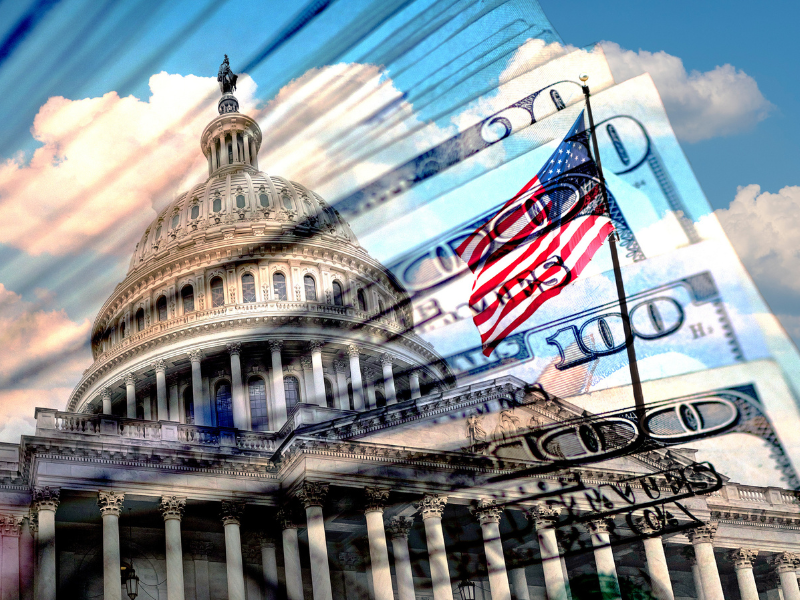At the turn of the twenty-first century, the U.S. economy was firing on all cylinders: the federal government sported a budget surplus of $122 billion, U.S. GDP was growing at a robust rate of 4.8 percent, inflation hovered around 2 percent, the trade deficit was less than $300 billion, the national debt was “only” $5 trillion, and the debt to GDP ratio was a healthy 55 percent.
Today, a little more than two decades later, the U.S. economy is on the rocks: The federal government’s budget deficit is $1.4 trillion, U.S. GDP is growing at an abysmal 1.1 percent, inflation above 5 percent persists, the trade deficit has ballooned to $948 billion, the national debt stands at a whopping $32 trillion, and the debt to GDP ratio has skyrocketed to an alarming 120 percent.
As difficult as it may be to fathom in today’s hyper-partisan political environment, in the 1990s, both Republicans and Democrats worked toward the common goal of balancing the nation’s budget. While it’s true that the Democrats participated in the project to balance the government’s checkbook somewhat begrudgingly, it still remains a fact that both parties put aside their differences and did what had to be done.
In late 1998, after negotiating with the GOP, President Bill Clinton declared, “We owe it to the people who made the sacrifice that brought us to this day to build for another day. We should not sit on or celebrate this balanced budget; we should build on it.”
Unfortunately, this seminal moment in modern American history was short-lived.
Less than two years after Clinton and his Republican counterparts in Congress managed to balance the nation’s budget for the first time in several decades, things went awry.
To be fair, both Republicans and Democrats are responsible for abandoning all notions of fiscal responsibility over the previous two decades. And, we should not overlook external factors—such as 9/11, the 2008 financial crisis, and the COVID-19 pandemic—which hastened more government spending. (Although, as a fiscal conservative, I would argue that the huge increases in spending in response to these events were ill-advised and imprudent).
However, despite the fact that both parties are culpable (to some degree) for the debt crisis we now find ourselves in, I cannot ignore the fact that over the past decade or so, only one party seems to have any interest in solving the problem.
Consider. President Barack Obama, who campaigned as a fiscal hawk and berated then-President George W. Bush for creating “a mountain of debt,” added $10 trillion in new debt himself, more than every other president combined.
Further, Obama signed into law monster bills such as the $800 billion American Recovery and Reinvestment Act and the $1.7 trillion Affordable Care Act. To make matters worse, in 2011, Obama quit negotiating with then-Speaker of the House John Boehner (R-OH) on what was deemed the “Grand Bargain,” which would have been a giant step toward putting the country back on firm fiscal footing.
Under President Trump, things generally remained the same: more spending, more debt, and lots of talk about spending cuts, but very little in terms of actual austerity.
Then, President Joe Biden entered the Oval Office and all bets were off. To date, Biden has added another $6 trillion in new debt, in little more than two years on the job.
However, unlike his recent predecessors, Biden is taking a “my way or the highway” approach when it comes to hiking the debt ceiling and negotiating with Congress.
To their credit, congressional Republicans have passed a debt ceiling bill that would raise the nation’s capacity to continue borrowing and racking up debt, as long as commonsense spending cuts are included.
Yet, like a temperamental and spoiled child, Biden refuses to even consider such a proposal.
Make no mistake, Biden is playing a dangerous game of chicken with the nation’s economy. While Republicans are presenting serious plans to address America’s out-of-control debt, Biden and his Democratic colleagues refuse to even admit that we are on the brink of a debt crisis.
With less than three weeks before the U.S. government “runs out of money,” it would behoove the Biden administration to engage with Republicans in a good-faith effort to pass a bill that increases the debt ceiling and includes necessary spending cuts.
Unfortunately, it seems like this is becoming less likely by the day. If the parties cannot reach a compromise, and things remain at an impasse, we could be on the verge of another government shutdown.
Yet, if past is prologue, the mainstream media will lambast the GOP for being obstinate, unwilling to find the middle ground, and irresponsibly putting the nation in jeopardy of “defaulting on the debt.” In reality, the exact opposite is true.


